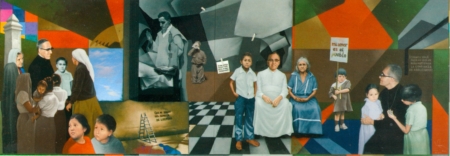From Cardinal Seán's blog
On Monday (8/8), at Regina Cleri we had a Eucharist with many of the priests and people from the diocese to honor Theresa McCallion, who has been working at Regina Cleri for 45 years! There was also a reception and lunch afterwards with many wonderful testimonials about her service, her generosity and her devotion to the priests and the community at Regina Cleri. I know I join everyone in congratulating Theresa and thanking her for her remarkable service to the Church.
Visit with Fathers Moises and Emilio
That evening (8/8) I was happy to be visited by some Capuchin friends.
Father Moises and Father Emilio were parishioners of mine in Washington D.C. who eventually entered the Capuchins and whom I ordained. Father Moises is originally from El Salvador, and he is now the pastor of Sacred Heart Shrine in Washington, on 16th Street. Many from Boston will know that church because we've had Mass there for the Boston groups going to the March for Life. It's a wonderful parish that has three Masses in Spanish, one in Haitian Creole, one in Vietnamese and one in English. Father Emilio -- whose father was with me in the Agrupacion Catolica and who used to help in the dental clinic in the Centro Catolico -- was a missionary for ten years in Papua New Guinea and is now in Cuba in the town of Manzanillo, near Santiago de Cuba. He's been in Cuba now for five years and is very happy to be working there. He was home visiting the friars and his family.
Lunch with El Salvadoran Consul
On Wednesday (8/10), we had lunch with the El Salvadoran Consul, Jose Edgardo Aleman Molina, who is from the same town in El Salvador as Father Moises: Santa Ana. In fact, they were neighbors there and even played on the same baseball team. We have a very large population of Salvadorans here in the archdiocese. The Consul said there are about 80,000 Salvadorans here in New England. The Consul gave me a very lovely card -- sort of like a Holy Card -- commemorating Archbishop Oscar Romero. On the back there's a quote from a celebration that was held on January 16th of last year, at which the president of the Republic of El Salvador, Mauricio Funes, made the following statement (I will translate the Spanish for you):
"In the name of the Salvadoran state, I ask forgiveness for the abhorrent crimes and violations of human rights during the armed conflict. May this forgiveness help to bring dignity to the victims, help to alleviate their pain and heal their wounds. May this gesture contribute to strengthen the peace, and further national unity can build a future of hope." It was a very dramatic admission of the participation of the Salvadoran government in the martyrdom of Archbishop Romero. I told the Consul that I was privileged to have known Monsignor Romero very well and spent a month with him in Puebla, Mexico and at other times had been in contact and visited him when he was in his diocese of San Salvador.
This was a very sad chapter in the history of the Church in El Salvador. It was during this same terrible time of conflict that Sisters Dorothy Kazel, Maura Clarke and Ita Ford and a lay missionary, Jean Donovan, were murdered. Obviously the fact that the government would be able to ask for forgiveness and to look back at those terrible war years says a great deal about the progress towards reconciliation.



















